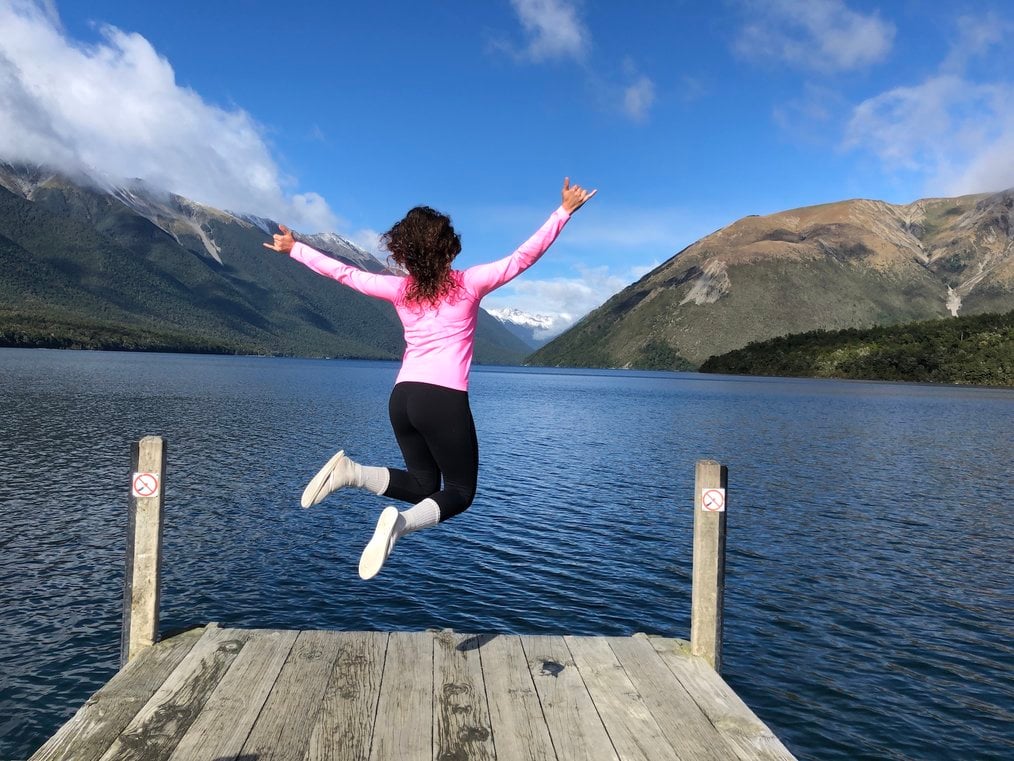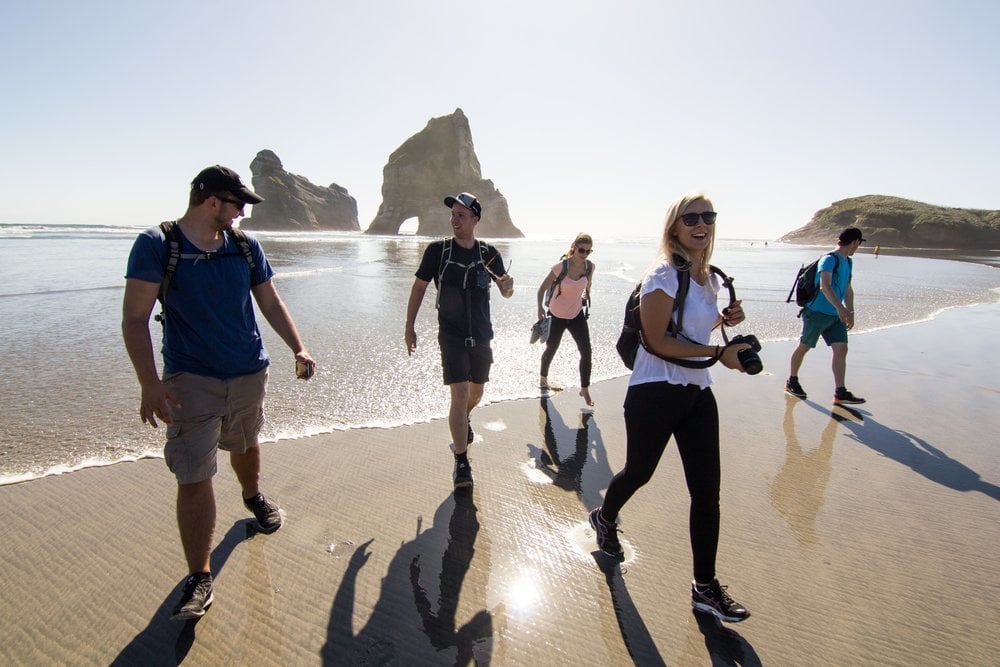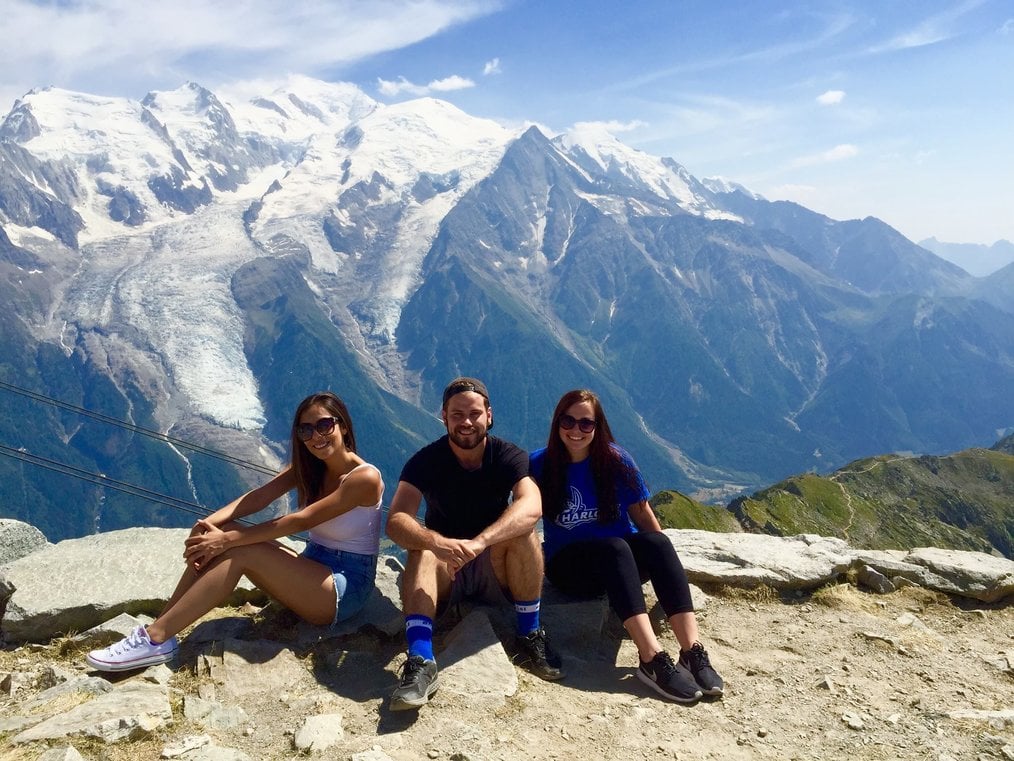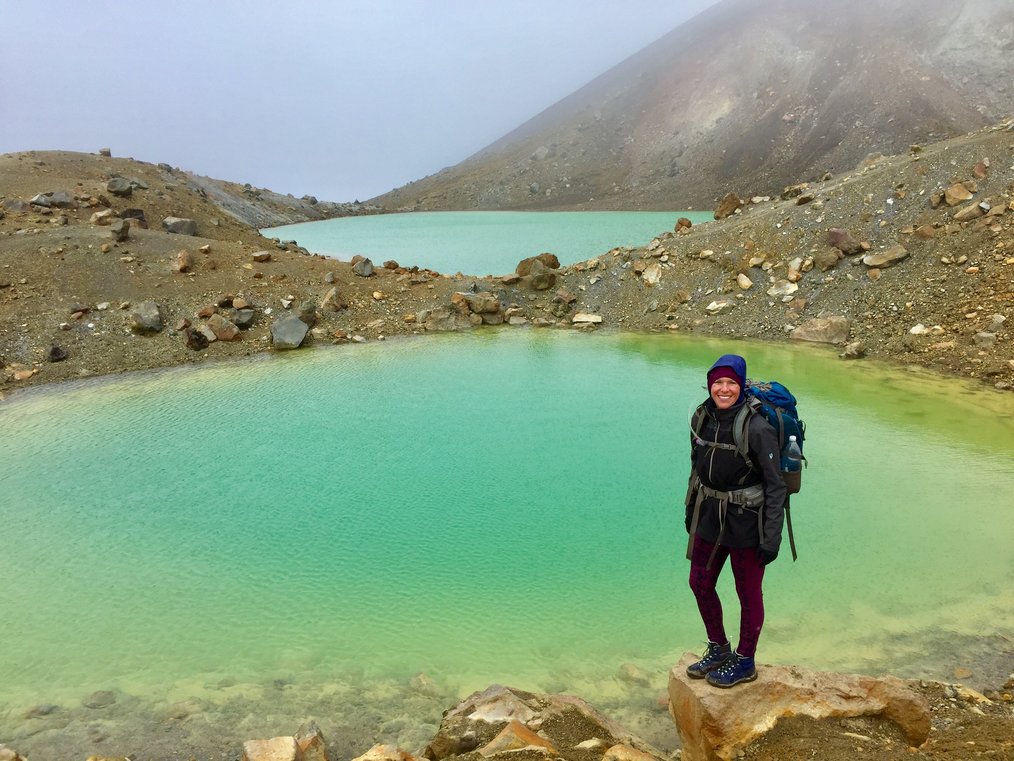What's it Like to Study Abroad and Be the First in Your Family to Travel?
Learn about how being a first generation traveler can change your perspective and the relationships you have with your home country.

My travels are among my best life experiences, but travel isn’t as readily available to everyone. For some people, whether they stay home or journey somewhere new isn’t a matter of choice, it's a matter of following through with values that your family taught you were important, with doing what's familiar. In travel, this has influenced a trend: if you're from a family who travels, you're likely to travel. If your family doesn't travel, you're less likely.
A first generation traveler is the first person in their family to pursue international travel experiences.
For this reason, first generation travelers are a pretty unique and radical bunch. I spoke with some first generation travelers to learn more about their experience, and what drove them to travel. Four students share what it's like to be the first in their family to go overseas, from fears on the road to relating to loved ones back home. Their stories are inspiring and insightful, so read on to learn what it's like to study abroad and be the first in your family to travel overseas.
What’s a First Generation Traveler?
In my interviews, many people were scratching their heads at this term. You may have heard of a first-generation college student, the first person in their family to pursue higher education, and this is similar.
A first generation traveler is the first person in their family to pursue international travel experiences. Most of the time, we take this to mean voluntary travel for work, education, or pleasure.
Brittany Quaglieri: From New England to Mexico
Brittany Quaglieri grew up with a single mom who didn’t go to college or travel. They only traveled to see family on holidays, and as a result, she didn’t leave New England until she was 19 years old, and at 20, she rode in a plane for the first time.
Brittany credits two seminar classes, both of which incorporated travel, for the onset of her wanderlust. Since then, she has experimented with solo travel, including a couple of days alone in Mexico and an upcoming solo trip to Iceland.
DJ Wells: It Was Germany that Changed Things
DJ Wells’s parents have always lived in Boston and have never lived outside of the United States. He’s the first generation of his family to, “have an innate desire to wander and see the world for [himself].”
He has traveled throughout the US, Mexico, and Canada, but feels his true awakening as a traveler happened during a study abroad semester in Gießen, Germany, outside of Frankfurt. He went on side trips around Europe, including to Luxembourg, Britain, and Poland, and even took a break from school after his semester abroad so he could move back to Gießen for another six months.
Afterward, he returned to the US and finished school, but has been back to Europe repeatedly to visit friends, and is currently planning to return to Germany to pursue a master’s degree.
DJ sees the initial connection he made to the German people and their culture as critical to the life he now lives. As he says, “these are opportunities I wouldn't have unless I did take the time to travel and step outside of my own culture.”
Brianne Miers: Discovering a Big World Outside her Small Town
Brianne Miers is from a very small town -- the same one where her parents (both teachers), were born and raised. They raised her to “collect experiences, not things,” a philosophy which Brianne holds to this day.
At 12, Brianne got her first taste of international travel when she had the opportunity to join a trip to China that her dad led for his high school students. In her words, “That’s really what sparked my interest in traveling because it showed me that there was a big world outside of my small town.”
Travel has become a huge part of Brianne’s adult life. She’s been to nearly 50 countries, and her highlights, which are chronicled on her blog, A Traveling Life, include, “studying abroad for a semester in Strasbourg, France, during college, and volunteering for a few months in Pokhara, Nepal, during graduate school. "From fall 2014 through winter 2015, I spent nearly five months on the road – on a solo trip through Cambodia, Vietnam, and Malaysia and then working for an adventure travel company in India. This fall I went to both Colombia and Peru.”
Al Armstrong: London Sparked a Love of Adventure
Al Armstrong grew up in New York state, and has mostly traveled within the US and Canada to visit family or explore with friends. At the age of nine, she was able to go to Rotterdam with family, but didn’t travel much outside of North America until she studied abroad in London for four months.
Since then, she and her partner have been able to fit quite a bit of travel into their lives, going to Spain, Ireland, Brazil, Bolivia, and India, usually for vacation or a loved one’s wedding.
Why Wouldn’t You (or Your Family) Travel?

As travelers, it's easy for us to focus on all the wonderful benefits of travel and sometimes we forget the challenges that we've overcome to make it possible. We also forget that there are a lot of reasons why young people, especially those who don't come from a family with travelers, wouldn't explore the world alongside us.
Mobility
Not all countries require that their major monuments or natural wonders be accessible for persons with disabilities, and transportation methods like planes, trains, and ferries can be difficult or impossible to navigate, depending on how high of a priority accessibility is.
Brittany’s grandfather, who traveled while young, “was injured during the war and eventually had to use a wheelchair full time. Traveling for him became increasingly more difficult and was not a priority.”
Emotional health
While it isn’t often discussed, mental health concerns can keep some would-be travelers at home, and make life on the road more difficult for those who venture out there.
Luckily, that hasn’t held Al Armstrong, who studied abroad in India, back, who opens up, saying, “Honestly too, as someone who has struggled with depression all my life, I often feel inspired by the connections I have made while traveling with people from different walks of life. Moments when you can laugh together, savor food together or maybe even share a few beers – without sharing the same language, culture or life experiences. Maybe it is corny, but there is something magical about those connections in particular.”
If this sounds like you, I'd highly recommend reading how to deal with depression while studying abroad.
Finances
Not surprisingly, financial concerns are often cited when discussing travel. The costs for obtaining a US passport, a requirement for all international travel, come in at almost $200 before you even think about buying a plane ticket or booking accommodations. That doesn’t even count transportation, internet access, or time off of work to get the forms, take the photo, and submit the paperwork.
Families without much or any disposable income are more likely to put their funds toward something more essential, or domestic travel, which is often thought of as a closer, cheaper, safer alternative.
Saving money is hard enough, but as Brittany explains, it’s even harder to do “in a community of non-travelers who have different priorities than me. Going out for meals several times a week or mindlessly shopping does not interest me, but I'm tempted to spend money in order to spend time with them. I try to suggest cheaper things to do but often strike out.”
Race
America is known for being a multi-ethnic country, and we certainly have our own contemporary and historical struggles with racism. But even so, traveling to a racially homogenous country can be a scary concept.
DJ’s parents were concerned when he first told them about his travel plans. “Since I'm African-American, my family and friends worry about me traveling, especially outside of the country. And I was too. But I've had way too many positive experiences on my journeys that have proven this notion wrong.”
Safety
All of my interviewees brought up their parents’ safety concerns at least once, so that is clearly a common worry.
Al shares that, “my mom sometimes worries about safety, but in fairness, she worries about that even when I’m traveling from Boston to Rochester.” Brianne says, “of course, my mom was always worried about my safety and whether or not I was eating!”
Regardless, we tend to fear what we don't know, and sometimes that fear holds us back (or keeps us from encouraging our loved ones) from exploring new places.
Something else?
But what about everyone else? What about those who have the means and ability, but simply choose not to travel?
Both Brianne and DJ’s parents, in spite of having the means and occasionally traveling on a different scale, never became interested in repeat international travel. DJ cites his parents’ comfort with their life in New England as a reason not to venture farther afield.
Al shares her thoughts: “What I find particularly interesting too is I when I know (not assume, but know) people have the means but they say, ‘Oh, I wish I could travel.’ It’s always strange to me, as it feels as though the only thing holding them back is themselves and things like (as one person admitted to me) fear of the language barrier in some places.”
All of my interviewees are American, which is due in part to the fact that the United States is such a geographically large country that one can easily travel without ever leaving it. When I initially posed the question online, a few Europeans piped up that very few Europeans spend their whole lives in only one country, given the size and proximity of European countries.
Different Types of Travel

What do we mean when we say travel? Many families in the United States have an immigrant history, and yet for some reason that isn’t often considered travel. For example, as Brittany says, “my mother’s side of the family traveled more out of necessity. For instance, my grandmother’s parents emigrated from Italy in 1905, which is a life-changing journey, but then never left Massachusetts after settling down.”
We tend to fear what we don't know, and sometimes that fear holds us back (or keeps us from encouraging our loved ones) from exploring new places.
Travel evokes the idea of leisure or a hobby, rather than something done for economic or safety reasons. But, as pointed out by many during recent discussions of race and immigration, the terms we use for different types of travel can have more to do with our assumptions about class, race and permanence than with anything else.
As Brittany pointed out, her grandfather, “decided to join the Navy. He did get to see the world, other than as an active duty sailor during the Korean War.” While the opportunity to see the world has certainly been referenced in recruiting materials, many people don’t associate members of the military with travelers. This, too, may be because military service is work, not pleasure, although business travel is a common concept.
Reconnecting with Friends & Family

Reverse culture shock or re-entry shock is a common experience for travelers of all kinds, but all the first generation travelers mentioned having a particularly hard time relating to friends and family back home.
As DJ says, “It's been a strange feeling to return to a community of non-travelers. All you want to do is tell everyone about the things you've seen and done, the people you've met, and the lessons you've learned. Everyone is keen to hear everything at first. But you don't want to sound like a show-off or run the risk of boring everyone.”
Sometimes, if loved ones don’t understand why someone chooses a life of travel, they can be confused or even annoyed, especially with the physical, and sometimes emotional, distance travel introduces to a relationship. DJ points out that, “when you try to convey that to parents or family members who don't see the point of having these experiences, sometimes it really can be a difficult concept to agree upon.”
As a result, “sometimes I try to tread lightly, mostly talking to the friends that I have traveled with, and that do travel, about my experiences.”
Physical distance can be tough on any relationship, but emotional distance can be even worse. If folks back home can’t afford to travel, they may be jealous, or simply worried that you’ll be so excited by the big wide world that you will no longer be interested in them. Those who have chosen a different path may be afraid that you judge their decisions in the same way you may fear that they will judge yours. And of course, there are the usual woes about safety or losing touch.
I often avoid talking about trips with people I care about who have made these remarks in the past, or avoid talking about it when I’m around friends or family whom I know are struggling financially.
Brittany shares, “I had a difficult time keeping some friendships going when I moved to California from Massachusetts after college because some friends didn’t understand why I moved. I had my own doubts about the move, but I was determined to make the best of it and enjoy myself. I couldn’t help but feel guilty for this when some friends would question my loyalty to them and ask why I left them behind.”
Things can get tense, especially if there are assumptions or misgivings about the money it takes to travel, or the way a traveler views their life back home and the people who choose not to leave it.
Al says, “I have been met with snarky remarks before, from both friends and family, when mentioning travel. Usually, it seems to come up around the issue of having the money to be able to do so. I often avoid talking about trips with people I care about who have made these remarks in the past, or avoid talking about it when I’m around friends or family whom I know are struggling financially. It is interesting because my partner doesn’t completely understand this about me... The way he sees it, I shouldn’t ‘edit’ myself. I completely understand where he is coming from, but I also do not like the idea of potentially making others I care about uncomfortable.”
The Encouragement Gap
Sometimes, the difference between those who travel and those who don’t comes down to experience and encouragement. For DJ, this meant that spending a semester abroad gave him not only the drive to travel again, but the knowledge and international connections to make it easier to do so.
On the other hand, lack of that knowledge and support can make it harder to take the leap. Brianne says, “when I was younger, I definitely felt that there was a gap -- my parents weren’t as encouraging or supportive as friends’ parents were of them traveling.
“I think, as I result, I didn’t consider opportunities (like the Peace Corps, for example) that I knew they wouldn’t approve of. It wasn’t that they didn’t love me or didn’t want me to be happy, I just don’t think they really understood where I was coming from.”
Lifestyle Choices
Brianne pointed out that, “most of [my parents’] friends’ kids got stable jobs in our hometown and were settled with a house and a significant other by their mid-20s, while I wanted absolutely nothing to do with that lifestyle.
“I’ve gotten to know many other travelers on the road with similar backgrounds as mine, and I’ve definitely enjoyed bonding with them over our shared experiences – we’re usually the only travelers in our families and considered to be a little odd/unconventional by their more traditional standards.
“It’s taken me a long time, but I’ve gotten to the point that I’m living life on my own terms and not really concerned what others think. My life might not look as traditionally successful as others -- I don’t have the nicest house, car, or clothes -- but I’m doing what I want to do, I’m supporting myself, and I’m happy.”
Bridging the Gap
The difficulties between first-generation travelers and their loved ones are many, but things can get better. DJ shared that, “At first, my family and friends met my travel plans with skepticism. As I became more comfortable traveling, my family and friends became more comfortable with the idea of me traveling as well. Especially with the idea of me moving to Germany.”
Brianne says that while relating to folks back home can be difficult, it is worth it and can be improved. “I have really struggled over the years with not being able to talk about my travel experiences with most of my friends and family. It’s not that they are not interested -- it’s just that they can’t relate. Recently, however, I’ve learned to be more accepting of the relationships as they are and not get my hopes up. I also make an effort to connect with them instead through other shared interests like movies, sports, or books.”
Can They Tell I’m a First Generation Traveler?

When Brianne was studying abroad, she says, “I admit I was a little embarrassed that my parents didn’t have the means (or even interest) to come visit me like so many of my fellow students’ parents did, so I kept that under wraps.”
DJ says, “a lot of the people that I did meet while traveling could tell that I was a first generation traveler. And I think it's important to convey that as one, too. I look for a connection when I meet people on my travels. I don't have family around the world; the people I meet and the friends I make along the way are very important to me because of just that. They give me a connection to the outside world.”
On the other hand, Brittany has had a different experience.
“Pretty often one of the first questions asked of me is if I did a lot of traveling with my family when I was young. Sometimes I think my desire to experience -- and my comfort in -- new and unfamiliar places makes me seem like I've been doing it for much longer than people realize. Or maybe it’s just because I’m constantly talking about places like I know them and have been there -- a side effect of being a geography student.”
Meanwhile, Al noticed some differences in the more seasoned travelers she has encountered along the way, saying, “It sometimes feels as though people who were able to travel with their families (whether because their families had money, certain citizenship status, etc.) sometimes take it for granted, in the sense that travel is their ‘normal.’”
Build a Network of Travel Buddies
Brianne shares this advice: “I’ve also developed a strong network of travel buddies over the past few years -- both online and in person -- that I turn to them for advice and inspiration, and to share my own stories, since I know they appreciate them.
“I started attending travel meetups in Boston, and I’ve also connected and communicated with many other travelers and travel bloggers through Facebook groups and Twitter chats, which has been fun and a great outlet.”
Advice for First Generation Travelers, from First Generation Travelers
Are you a first generation traveler thinking of studying abroad? Then take these tips from our interviewees:
Brittany
If your family is resistant, I say do it anyway.
It's easier to travel now than ever before. If your family is resistant to your desire to travel or your friends give you a hard time for leaving them behind -- I say do it anyway.
Then show them all the amazing pictures you took! Tell them stories of all the amazing things you’ve done! They will hopefully understand one day.
Al
Don’t let fear (other people's or your own) dictate where you travel.
I would say -- while using your smarts, of course -- don’t let fear (other people's or your own) dictate where you travel. I think it is a good life lesson too, but I feel the thing I hear most from people reluctant to travel or on the fence about it are fears. Fear of getting lost, not knowing the language, fear of being a victim of a terrorist attack... I’ve heard a lot of different ones.
While there are clearly considerations to take (a good example being, “I’m vegan -- what food staples are available where I am going?”) and I empathize with feeling fearful (I have depression and anxiety, fear often surges through my veins), it is good to at least question those fears if/when able. Just to make sure they aren’t holding themselves back from experiences that could end up being some of the best of their lives.
Also, I LOVE LOVE photography. I like social media. Those things being said, try to take in as much as you can. Sometimes you have the most fun when you leave the iPad or camera behind and just wander, soaking in everything.
DJ
The world is smaller than it's ever been and it would be a shame to watch it turn from the same place your entire life.
I've had my parents go from telling me that study abroad is impossible to helping me save up for my tuition and board. I've had friends tell me that I inspire them because I don't go to typical places and do typical things.
It's really wonderful when you have a goal and your support network is convinced of your goal as well. It was not easy at first. Not at all. I had my bubble busted so many times. But now, because I've taken steps toward pursuing my goals of traveling and possibly moving outside of the US, I have my most important people in my corner.
To a first-generation of travelers: do it. Even if it means sacrificing money, time, etc. Move to another country. Learn another language. Meet new people. Try crazy food. Dance to new music. Connect with your brothers and sisters outside. Be a human! The world is smaller than it's ever been and it would be a shame to watch it turn from the same place your entire life.
Brianne
First-generation travelers have to be very brave.
I think first-generation travelers have to be very brave. They need to be true to themselves and focus on making travel a priority, if it’s important to them, regardless of what well-meaning friends and family members say.
They’re likely to encounter a lot of negativity -- that they’re taking risks with their finances, careers, relationships, and/or safety -- so they need to block that out and remember that their own version of success is likely very different than their parents.
“Part of Who I Am”
When asked if they would continue traveling, the answer was a resounding yes. For many first-generation travelers, like Brianne, travel is, “part of who I am and who I will (likely) always be.”
I’ll leave you with DJ’s inspiring words:
“I am going to keep traveling. I love it and I see it being a very important part of my future. I think that I am young and in a time in my life where I can take the time to travel and explore the world. I think traveling is a great way to see what it's like to be human and to share this experience with others. I want to be able to tell my children stories about my adventures in the future.”
This was post was originally published in March 2016, and it was updated in July 2020.
